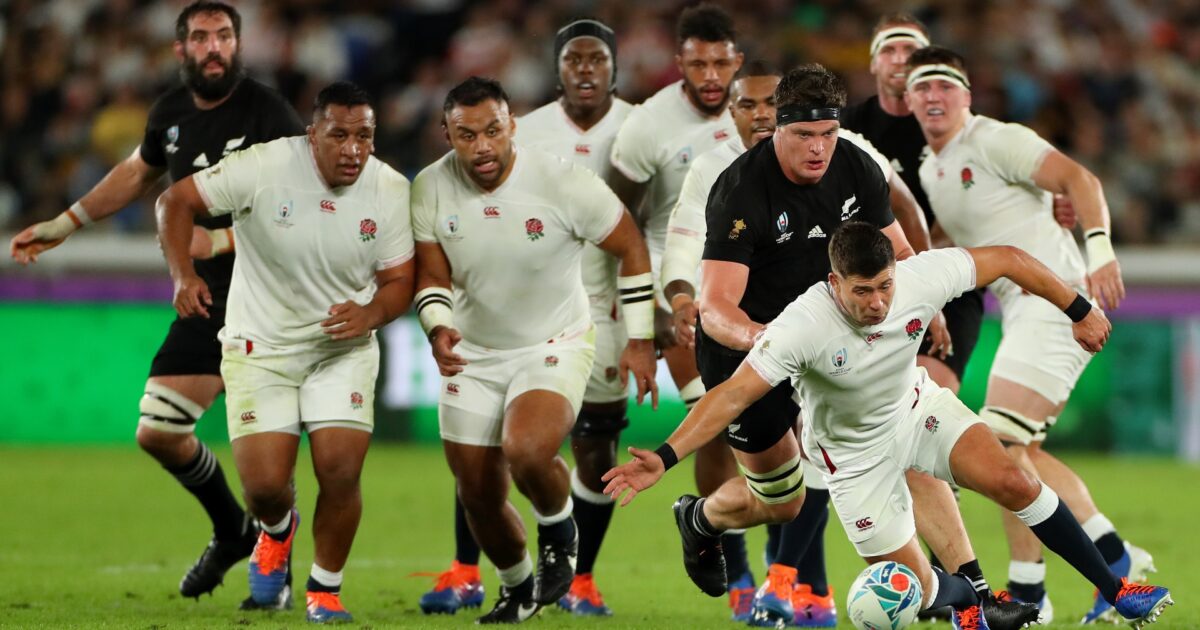Professional rugby's 25th birthday warning: 'You need a blockbuster narrative to keep fans interested'

Brett Gosper believes that rugby union has “come a long way very quickly” as it reaches 25 years as a professional sport – but the World Rugby chief executive has also outlined some of the future challenges that will need to be met.
It is a quarter of a century on Wednesday that the late Vernon Pugh, in his role as International Rugby Board chairman, declared it an “open” sport. The timing of that announcement, if not the decision itself, caught many by surprise.
And two-and-a-half decades later, countless pages have been written – many celebratory such as Rugby World Cup’s success and the continuing growth of women’s rugby, but also sorry sagas like the Harlequins ‘Bloodgate’ disgrace in 2009 and recent salary cap scandal surrounding Saracens.
In an interview with the Guardian five years ago, former England fly-half and ex-Rugby Football Union professional rugby director Rob Andrew described rugby going professional in 1995 as being “like the Wild West”.
And while rugby has sometimes had a tendency to press the self-destruct button during its professional era, it is also a virtually unrecognisable sport on and off the pitch since that August weekend afternoon in Paris 25 years ago.
"Moody living that prop kind of life"
Three classy offloads, followed by a powerful finish from Joe Moody. What a try! 🔥 @AllBlacks pic.twitter.com/B4slPcmZyB
— World Rugby (@WorldRugby) August 24, 2020
“Twenty-five years, while it is a long time, in professional sporting history it’s a tiny piece of history,” said World Rugby boss Gosper. “If you talk to people in other federations in professional sport, they would be quite shocked that rugby has only been professional for that period of time, given things like the World Cup and leagues around the world.
“There is kind of a feeling that when the outside world is looking in, we have come a long way very quickly, given that it is only 25 years. Super Rugby and the European Cup were introduced at that time, which added a huge dimension of visibility and attractiveness to the sport.
“And international rugby over the period has grown hugely in terms of the size, scale and fanbase. There were only about one million people playing rugby in those days. There are about 9.5m now, and the World Cup has grown to be the third-biggest sporting event on the planet.
“We have only really been measuring our fanbase since 2013 and it has grown 30 per cent since then to about 405m people. Eighty-eight per cent of people feel it is a more exciting sport than five years ago and about 82 per cent feel it is safer than it was five years ago.”
The World Cup has grown in size and revenue with each staging, and Gosper readily recalls South Africa’s 1995 triumph and the unforgettable images of Nelson Mandela presenting Springboks skipper Francois Pienaar with the Webb Ellis Trophy.
“The Mandela influence in South Africa in 1995, it was the first time that Rugby World Cup transcended the sport itself and it laid the ground for probably what was really the first ‘super’ World Cup from a commercial and ticketing perspective in Australia in 2003,” Gosper said.
“And moving it to a place like Japan last year demonstrated the variety of a global event in its full version. We had 2.04billion video views in the Japan World Cup, which is Olympic in scale. While I won’t say that Japan was the coming of age, it was certainly the confirmation that this property (World Cup) is a massively-global property.
“You can take the World Cup to new territories, and you should, in order to grow the sport. The inclusion in the Olympics (since Rio 2016) and the effect that has had on gaining new fans has also been substantial. The Olympics should not be underestimated as a recruiter of a new fan-base.
“Some of the progress that has been made in player welfare, the management of concussion, in particular, rugby has blazed a trail in that area, while the growth of women’s rugby has been huge. There were more new women-registered players than new men-registered players last year.”
This looks bleak… https://t.co/ksNuKboRQG
— RugbyPass (@RugbyPass) August 25, 2020
Gosper added that “geography and gender” are among critical areas for growth, while also placing major importance on the players. “The women’s game will continue to grow massively. And the game must also grow in new geographic markets to create the wealth it requires – the US in particular, other parts of South America, Russia, China, other parts of Asia.
“The geographic growth of rugby is inevitable, but it needs to be managed and needs to be accelerated in some cases. Increasingly, the players are at the heart of the decisions that we make, which is a big change over the 25-year period.
“Management of the players between club and country and finding some harmony in the way the club and international game co-exist because they are both critical to the future of the sport is going to be very important.
“It’s about things that will capture the imagination of the emerging young fan. You need a blockbuster narrative to keep fans interested, and the Olympics and World Cup will continue to grow the game into new markets and new territories.”
- The history behind the momentous decision of rugby union becoming a professional sport can be discovered at the World Rugby Hall of Fame in Rugby, Warwickshire. Admission is free
'It did turn sour'
Ed Griffiths' behind the scenes insight into the Springboks 1995 #RWC win 🇿🇦, the back story to the Mandela moment, confronting flag-waving fans, holding clothes hangers for luck & the lost opportunity of it all
– writes @heagneyl https://t.co/XpSHESE4cF
— RugbyPass (@RugbyPass) May 24, 2020













































